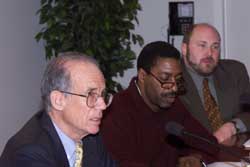US Policy and the Global Environment: Memos to the President
Overview
John A. Riggs, Executive Director, Program on Energy, the Environment,
Donald Kennedy, Bing Professor of Environmental Science, President Emeritus,
Franklin C. Moore, Acting Director, Center for Environment,
March 16, 2001—How should the Bush administration respond to critical global environmental problems? The Aspen Institute last summer asked prominent scientists and academics along with business leaders and environmental activists to formulate "memos to the president" on U.S. policy towards such linked issues as climate change, population, water, energy, and agriculture. The resultant book–"U.S. Policy and the Global Environment: Memos to the President"–was presented at the Wilson Center by its co-editors John Riggs and Donald Kennedy (who is also on the advisory committee of the Environmental Change and Security Project). Franklin Moore of USAID served as discussant.
"We Share the Same Atmosphere"
Despite the fact that environmental issues and their solutions are indisputably global in scope, Donald Kennedy said the purpose of "Memos" was to get the attention of the next U.S. administration with an assessment "aimed very much at U.S. environmental policy." (The book is available in PDF form at the link to the left and will also published in serial form in Environment magazine over the next year.)
Kennedy said that The Aspen Institute began the project with two assumptions: (1) global change—in climate, land cover, population growth, air quality, and water resources—is rapidly accelerating; and (2) while poverty, hunger, and inequitable income distribution are largely located in the developing world, a narrow definition of national interest will be ineffective in solving them.
But aren't these problems too large to attack as a set? No, said Kennedy: work on one will help with the others. He also argued that United States leadership is essential to this process. The United States can help, said Kennedy, both (a) because of its immense and transferable knowledge bank in technology and science, and (b) because it is in the U.S. national interest to take an interest in quality of life globally. "It's not just because we share the same atmosphere," said Kennedy. "We can't afford to see the developed world descend into a spiral of poverty and conflict that will eventually reach us."
Kennedy cited several papers in "Memos" as examples of the complexity and tradeoffs that the Bush administration will have to comprehend in order to effectively deal with transnational environmental and human security problems. He also warned that water is the next flashpoint issue in many regions; 70% of the world's major rivers have international watersheds, providing "tinder for conflict." Kennedy concluded by calling for a rigorous international governmental regime to be established for dealing with these problems.
The Importance of Civil Society
Franklin Moore called "Memos" a "very useful capsulation of why the environment is important to the United States, to its foreign policy, and to sustainable development" in general. He said that the book strikes an important balance between the moral necessity of dealing with environmental issues and the necessity of seeing these issues as essential to national security.
"It is really civil society that leads and must lead the way."
Franklin Moore, USAID
And Moore lauded several articles in the book that touch on the increasingly important role of civil society in global environmental governance. "There is a real concern about subjecting governments to additional costs for these issues," he said. "It is really civil society that leads and must lead the way." He also cited the overwhelming demand by Home Depot consumers for lumber from certifiably sustained forests as an example of the public driving corporations towards environmental consciousness. "They can't keep enough of the stuff in stock," said Moore.
However, Moore noted that "Memos" fails to address "depletion of the earth" (soil depletion and desertification), which he called one of the four fundamental global environmental issues. And he argued that, while overseas development aid has a critical role in sustainable development, the proper mix of such aid with trade, investment, and domestic sources of finance remains unclear. "We have only been in the development aid business for 55 years," Moore said. "Before that, every nation developed through trade and foreign investment."
The Political Climate for Sustainability
 Topics for audience questions ranged from international standards for sustainable production to the soundness of the science behind claims of climatic change. While Kennedy supported international sustainability standards, Moore said his negotiating experience has taught him that such standards gravitate to the lowest common denominator and are often irrelevant to developed countries. He argued instead for respecting local and regional conditions in the formulation of global policy. "This should be done on a forest-by-forest basis," Moore said. John Riggs added that alternative standards set by nongovernmental organizations and civil society have (with public effort) become effective consumer and investor guides.
Topics for audience questions ranged from international standards for sustainable production to the soundness of the science behind claims of climatic change. While Kennedy supported international sustainability standards, Moore said his negotiating experience has taught him that such standards gravitate to the lowest common denominator and are often irrelevant to developed countries. He argued instead for respecting local and regional conditions in the formulation of global policy. "This should be done on a forest-by-forest basis," Moore said. John Riggs added that alternative standards set by nongovernmental organizations and civil society have (with public effort) become effective consumer and investor guides.
"We can't afford to see the developed world descend into a spiral of poverty and conflict that will eventually reach us." Donald Kennedy, co-editor, "U.S. Policy and the Global Environment: Memos to the President"
Kennedy said that the Bush administration would not be particularly receptive to "Memos" right now, in part because the book is based in science and so many of the administration's senior science positions remain unfilled. Moore added that the upcoming 2002 Rio +10 conference in Johannesburg presented a variety of opportunities for environmental advocates. However, Moore cautioned that it would be crucial for these advocates not to see the world as simply divided into developed and developing countries. Rather, large economies with large industrial components (such as China, India, and Brazil) as well as small island nations and poor countries all have different responses to the significance of overseas development assistance, trade, investment, and the environment. Recognition of this, said Franklin, would productively alter the Rio dialogue and allow new solutions to come forward on critical problems.
 "The UN also doesn't give enough credibility to local governments as a group," Moore added. "With localities represented, you would get a very different discussion of urban and environmental issues."
"The UN also doesn't give enough credibility to local governments as a group," Moore added. "With localities represented, you would get a very different discussion of urban and environmental issues."
"The Genome I Want To See Is Rice"
In response to a question about the scientific consensus expressed in "Memos," Kennedy said that, while the science on the importance of such issues as global warming, biodiversity, population, and environment and conflict is overwhelmingly convincing, this science needs to be better explained as well as exported more effectively to some developing countries. He also stressed the need for more research into crop improvement and agronomic methodologies, saying that "genomics has more to offer to third-world agriculture than first-world medicine." "The genome I want to see is that of rice," said Kennedy
Documents & Downloads
Hosted By

Environmental Change and Security Program
The Environmental Change and Security Program (ECSP) explores the connections between environmental change, health, and population dynamics and their links to conflict, human insecurity, and foreign policy. Read more
Thank you for your interest in this event. Please send any feedback or questions to our Events staff.








